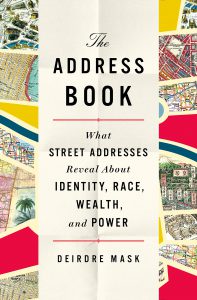 This week we’re looking at an interesting history of a seemingly mundane topic. This week, we’re looking at The Address Book by Deidre Mask.
This week we’re looking at an interesting history of a seemingly mundane topic. This week, we’re looking at The Address Book by Deidre Mask.
Fairly quickly in this text, Mask establishes herself as one of the “new breed” of historians more concerned with editorial story than with actual historical fact. That noted, the stories she chooses to highlight do seem to show the origin of the subtopic in question fairly well in most cases, though there are a few times where the “editorial narrative” focus takes over and Mask pointedly notes that while several things happened seemingly at once, she is highlighting the story she prefers. And it was this part of the tale that ultimately lost a star from me – she could have explored these same stories but also provided the actual historical context – did the Austrian ruler do that first or did the Spaniard or the Greek or whoever was also doing it? – and it would have solidified the history without sacrificing story.
Overall an utterly fascinating look at several issues related to an address, having one, and what having one and living in a particular location means, this spans the history from the earliest known addresses to how various parts of them came to be to current issues related to addressing both New York City and the slums of Calcutta. Along the way, we find things that these days we tend to take for granted – house numbering, why odd numbers are on one side of the street and even on the other, how roads are named, the origins of the ZIP code, and many more – are in many cases fairly recent developments and just what they meant to the people who first created them.
A truly fascinating read even with the editorial slant, this is one of those esoteric books that will give you plenty of nerdy trivia bits for parties. Very much recommended.
As always, the Goodreads/ Amazon review:
Compelling Yet Not Complete. Mask tells some excellent stories about various issues early in the development of various features and issues with an address, and does so in a way that is very easy to read. That noted, at times (such as during the discussion of how house numbers came to be) she outright admits that several things “seemingly happened at once” and that she went with the story she prefers herself – as opposed to what actually happened first, presumably. It was these little tidbits here and there that were just enough to warrant removing a star – still a compelling and interesting book, but not as factually accurate as it arguably could have been. Still good enough for a general overview of the subject, but I’m not sure I’d want to go up against a Postmaster General in address trivia based on just reading this book. Still, as noted, a very easy and very informative read and thus very much recommended.
